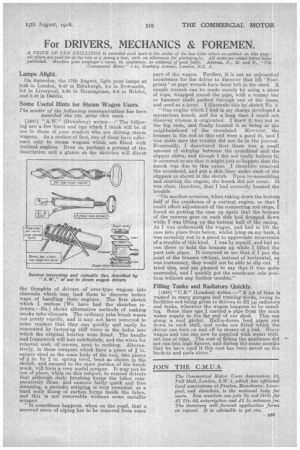For DRIVERS, MECHANICS & FOREMEN.
Page 21

If you've noticed an error in this article please click here to report it so we can fix it.
A PRIZE OF TEN SHILLINGS is awarded each week to the sender of the best letter which we publish on -this page ;. .all others are paid for at the rate of a penny a bine, with an allowance for photograph.5. All notes are edited before being published. Mention pour employer's name, in confidence, as evidence of good faith. Address, A, M. and F., " The Commercial Motor," 7-1&, Ilosebery Avenue, London; E.G. 1.
Lamps Alight.
On Saturday, the 17th August, light. your lamps at 8.50 in London, 9.43 in Edinburgh, 9.4 in Newcastle' 9.5 in Liverpool, 8.58 in Birmingham, 9.0 in Bristol, and 9.48 in Dublin.
Some Useful Hints for Steam Wagon Users.
The sender of the following communication has been awarded the 10s. prize this week.
[1887] " A.W." (DeWsbury) writes :—" The following are a few hints and tips which I think will be of use to those of your readei•s who are driving steam wagons. As a matter of fact, two of them have reference only to steam wagons which are fitted with vertical engines. Even so, perhaps a, perusal of the description and a glance at the sketches will direct the thoughts of drivers of over-type wagons into channels which may lead them to discover better ways of handling their engines. The first sketch which I enclose We have had the sketches redrawn.—En.] shows alternative methods of making smoke tube cleaners. The ordinary tube brush wears out pretty rapidly, and it may not have occurred to some readers that they can quickly and easily be renovated by fastening stiff wires in the holes into which the original bristles were fitted. The handle and framework will last indefinitely, and the wires for renewal cost, of course, next to nothing. _Alternatively, in those scrapers which have a piece of in. square steel as the main body of the tool, two pieces of in. by in. spring steel, bent as shown in the sketch, and secured to the main portion of the brush stock, will form a very useful scraper. It may not be out of place, while on this subject, to remind drivers that although daily brushing keeps the tubes comparatively clean, and ensures fairly quick and free steaming, a periodic scraping is very essential, as a hard scaly hning of carbon forms inside the tubes, and this is not removable without some metallic scraper.
"It sometimes happens, when on the road, that a. screwed piece of piping has to be removed from sonic part of the wagon. Further, it is not an unheard-of occurrence for the driver to discover that hiss. ' Footprints ' or pipe wrench have been left in the shed. A simple wrench can be made merely by using a piece of rope, wrapped round the pipe, with a tommy bar or hammer shaft pushed through one of the loops, and used as a lever. I illustrate this by sketch No. 2.
• "On engine which I had in my charge developed a mysterious knock, and for a long time I -could not discover whence it originated. I knew it was not in the big ends, and finally located it as being in the neighbourhood of the crosshead. However, the brasses in the rod at this end were a good fit, and I was quite sure the trouble did not lie in the journal. Eventually, I discovered that there was a small amount of sidepla.y between the crosshead and the slipper slides, and though I did not really believe it, it occurred to me that it might just so happen that the knock was due to this cause. I therefore removed the .crosshead, and put a thin liner under each of the slippers as shown in the sketch. Upon re-assembling and starting the engine, the knock did not recur. It was clear, therefore, that I had correctly located the trouble.
"On another occasion, when taking down the bottom half of the crankcase of a vertical engine, so that I could effect adjustment of the connecting rod steps, I found on putting the case up again that the brasses of the reverse gear on each side had dropped down while I was lifting up the bottom half of the casing. As I Was underneath the wagon, and had to lift the case into place from below, whilst lying on my back, :I was certainly not in a mood to appreciate recurrence of a trouble of this kind. I was by myself, and had no one there to hold the brasses up while I lifted the part into place. It occurred to me that if I put the joint of the brasses ve-rtical, instead of horizontal, as was customary, they would not be able to slip out. I tried this, and am pleased to say that it was quite successful, and I quickly got the crankcase into position without any further trouble."
Filling Tanks and Radiators Quickly.
[1888] " C.B." (London) writes :—" A lot of time is wasted in many garages and running 'sheds, owing to facilities not being given to drivers to fill up radiators and tanks, wherever the wagon happens to be standing. Some time ago .I carried a pipe from the main water supply to the far end of our shed. This ran along a roof girder. Half-a-dozen feed pipes run down to each stall, and cocks are fitted which the driver can turn on and off by means of a rod. Ev,ery wagon and van can now be supplied with water with.out loss of time. The cost of fitting the appliance did not run into high figures and during the many months that we have used it this cost has been saved on the bucket's and pails alone."






















